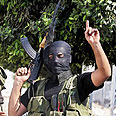
Growing terror threat
Photo: AP
In the wake of the murder of a boy in Bat Ayan Thursday, we shall again be reciting the cliché about the quiet in the West Bank being a case of artificial calm. And again, officials will be explaining to us that this was a spontaneous attack carried out by a local cell or single attacker and therefore it was very difficult to thwart.
For several months now, Israeli security officials have been pointing, with concern, to a regular and ongoing increase in the scope of attacks in the West Bank and Jerusalem. Indeed, they still define the phenomena as "atmosphere attacks" that have no organizational, planning, or operational connection, yet the distance from a series of successful "atmosphere attacks" to a popular flare-up of the entire area could be very short.
However, the spontaneous attacks in recent months in Jerusalem and in the West Bank are not so few. They are increasingly becoming a sequence; a routine matter.
Teen Murdered
Efrat Weiss
Terrorist carrying axe attacks and kills 16-year-old youth in settlement of Bat Ayin in Gush Etzion Thursday noon; seven-year-old child sustains moderate injuries. Terrorist flees scene, IDF launches manhunt. Palestinian Authority security official tells Ynet terrorist apparently working on his own
If these glowing embers are not cooled off, the term "Intifada" may even be pulled out from the archives. After all, Hamas is hoping for this.
Indeed, arrests and interrogations carried out in the West Bank in recent months uncovered the fact that a significant number of the "sole attackers" were guided by masterminds from the Gaza Strip. Gaza and Hamas are the engine of the militant revival in the West Bank.
At this time, Hamas' efforts in the West Bank are mostly aimed at establishing a broad and effective political infrastructure. The arrests of senior Hamas figures in the West Bank are part of the battle which Israel and the Palestinian Authority are engaged in, in order to curb the rise in Hamas' political power in the area. It's clear to everyone that the moment Hamas' political infrastructure in the West Bank will be rebuilt, intense military activity will be premised on it. We're not there yet, but it's not too far off.
Even when the West Bank seemingly does not make security headlines, there is never a vacuum in our relationship with the Palestinians. Israeli officials like to highlight the fact that for the first time since the 2000 Intifada, the IDF removed the Hawara roadblock in Nablus; they prefer to talk less about the fumes of nationalistic fuel that have been accumulating in the West Bank since Operation Cast Lead.
Nationalistic zeal
We enjoy taking pleasure in the relatively effective operations of PA security arms and the dramatic decline in suicide attacks (the last terrorist who managed to carry out such attack did it back in April 2006 in Tel Aviv.) However, we are less interested in hearing about a terror cell in the Mesoa area, for example, which for a long time now had been operating at night and firing at random targets.The West Bank is seeing the accumulation of immense energies of frustration and nationalistic zeal that are looking for an outlet. One of the manpower reservoirs that carry out these attacks are former Fatah activists. We are dealing with radicals who left the established groups and are trying to operate independently. It is possible that the cell operating in connection with the Bat Ayin terrorist came from such group of young radicals who are former Fatah activists.
Another problematic group operating in the West Bank comprises armed groups created by our old friend Mohammad Dahlan. His anxiety over Hamas' return and the prospects of an armed clash with Hamas in the West Bank taught Dahlan that he can only count on himself. Therefore, he surrounds himself with gunmen who provide security and safeguard his interests. However, these armed groups are not controlled by the Palestinian establishment. They too give rise to attackers who target Israelis.
The probe into the recent murder of two police officers in the Jordan Valley has not ended yet. The investigation into the car bombing attempt in the Haifa mall is not over either. Meanwhile, the scope of attacks in the West Bank is growing; this is no longer coincidental, spontaneous, or sporadic.















